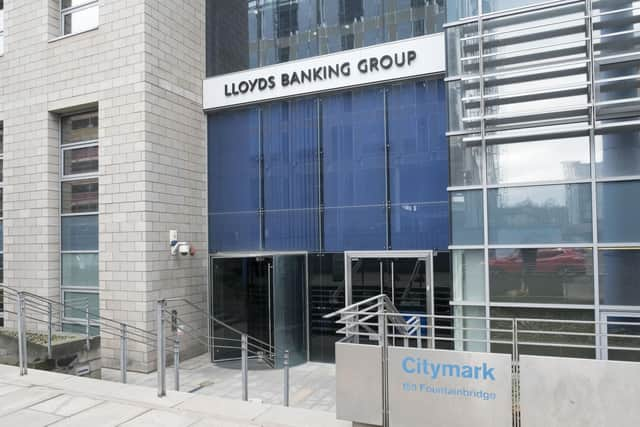Bank of Scotland owner Lloyds sees signs of consumer belt-tightening as profits cool: reaction
and live on Freeview channel 276
The banking giant said it has seen 1.2 million subscription contracts cancelled over the past six months, with customers spending more on energy and food as the cost-of-living crisis bites.
Lloyds, which ranks as the UK;s biggest mortgage lender, booked an impairment charge of £177 million as it warned that the squeeze on consumer spending could affect borrower disposable income, while it also downgraded its growth forecasts for the UK economy as the Ukraine conflict compounds inflation pressures.
Advertisement
Hide AdAdvertisement
Hide AdUnveiling first-quarter results, the group posted a 14 per cent drop in pre-tax profits to £1.6 billion, from £1.9bn a year earlier, though the fall was not as bad as feared as costs rose less than expected.
Chief executive Charlie Nunn said: “Whilst we are seeing continued recovery from the coronavirus pandemic, the outlook for the UK economy remains uncertain, particularly with regards to the persistency and impact of higher inflation.
“We are proactively contacting customers where we feel they may need assistance and will continue to help with financial health checks and other means of support. We encourage customers, where affected, to get advice early and talk to us.”
The group said its customer data showed cutbacks on discretionary spending, with cancelled subscriptions including for streaming services and gym memberships, though it said this may also reflect lifestyle changes amid the pandemic.
Advertisement
Hide AdAdvertisement
Hide AdLloyds chief financial officer William Chalmers said that, while borrowers’ arrears remains low and below levels seen before the pandemic, the bank is braced for these to rise.


The group, which also owns Scottish Widows, now expects the UK economy to grow by a lower than first forecast 3.6 per cent in 2022, with expansion flatlining in the second quarter, but it said this will be offset by stable house prices and modest unemployment.
Lloyds saw costs rise to a lower-than-forecast £2.15bn in the three-month period, from £2.11bn a year earlier and upgraded its full-year outlook for key profit measures, including its net interest margin, thanks to higher UK interest rates.
Underlying profit before impairment was up 26 per cent to £2bn in the quarter, driven by strong net income growth.
Advertisement
Hide AdAdvertisement
Hide AdMark Crouch, analyst at investment network eToro, said: “Lloyds has beaten its profit forecasts for the first quarter, but the outlook is looking quite uncertain for the banking sector right now.
“On the one hand, rising interest rates mean fatter margins; however, on the other, the cost-of-living crisis means people are less likely to borrow money. Worse, those who have will be less likely to pay it back.”
Richard Hunter, head of markets at Interactive Investor, noted: “Against the backdrop of an unstable UK economy and an increasingly squeezed consumer, Lloyds has made a generally impressive start to the year.
“The company’s fortunes will inevitably be tied to those of the UK, but Lloyds has a tight hand on those factors within its direct control.”
Comment Guidelines
National World encourages reader discussion on our stories. User feedback, insights and back-and-forth exchanges add a rich layer of context to reporting. Please review our Community Guidelines before commenting.